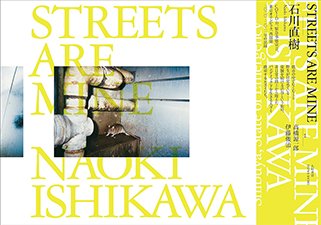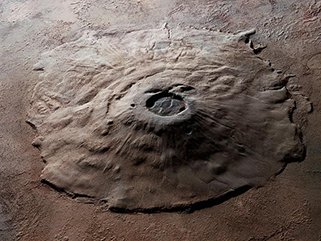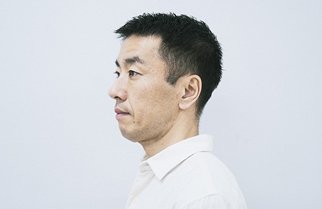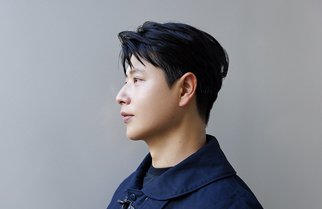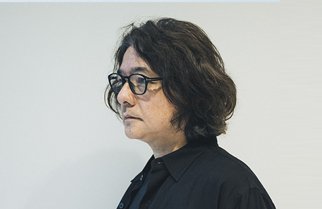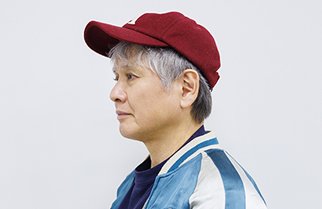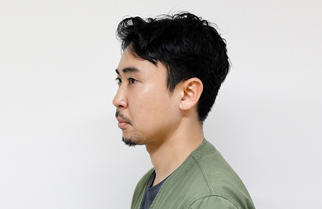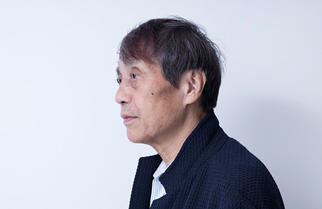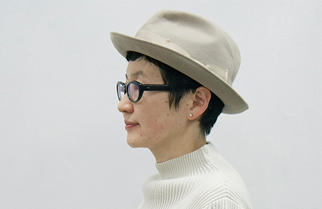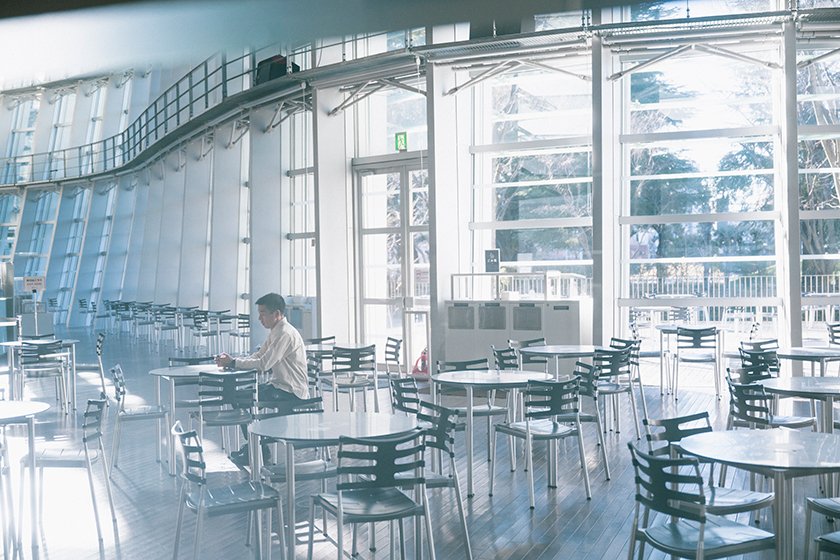
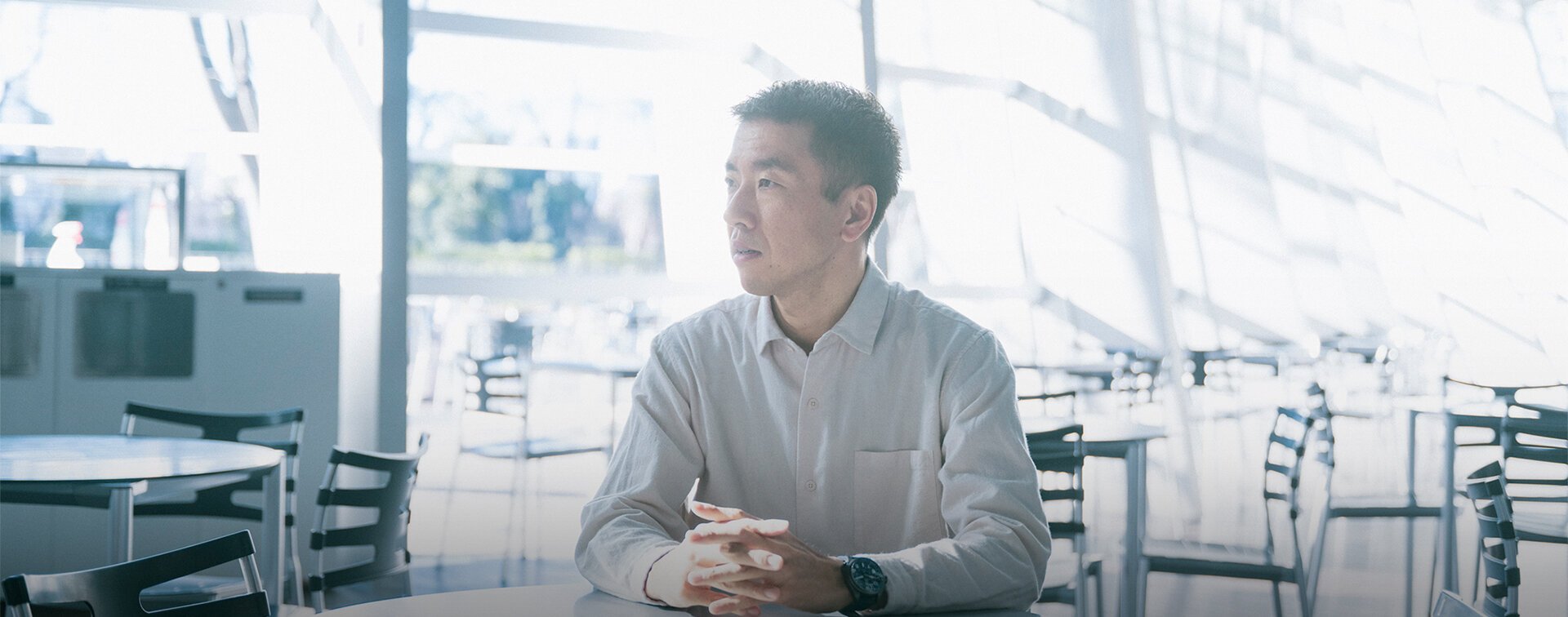
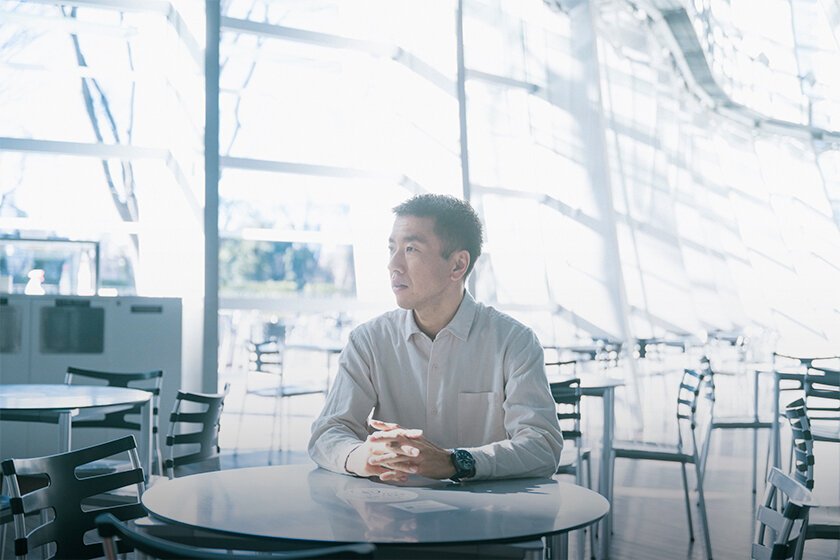
INTERVIEW
155
Naoki IshikawaPhotographer
Try Creating a New Map of the City With Your Own Sense of Scale
Always be open to encountering the unknown
Naoki Ishikawa has traveled the globe, photographing chaotic cities and extreme natural environments alike to document the world in its current timeframe. He has successfully climbed thirteen out of the fourteen peaks over 8,000 meters, and is just about to set out on an expedition to summit the last one (as of the time of the interview). In this interview, Ishikawa talks about his approach towards the places and people he visits, cultivated through his hectic photographic journeys around the world, what it means to acclimatize to extreme environments, and the future of photography now that anyone can take casual photos.
The relief of being able to get lost in the busy crowd
I'm actually a lot more familiar with Roppongi than you might think. I go there often to see the exhibits at the National Art Center, Tokyo. For a time, I went to a professional photo lab that used to be in Nishi-Azabu almost every day to get film developed and prints made. Now I usually go to a photo lab in Nogizaka, but I sometimes walk there from Roppongi Station. Another thing is that I find working at Cafe Renoir near the Roppongi intersection to be really productive. People in all kinds of jobs chat away there about all kinds of things, and it's the perfect background noise. It's kind of a relief to listen and think, "Ah, everyone's living their lives." [laughs] When I'm overseas I get mixed into crowds of diverse people, but here in Tokyo where I grew up, there are people I know, shops I frequent, stuff like that. That inevitably means other people will recognize me, so I actually feel more relieved when I'm in a busy place, lost in the crowd.
A long time ago, it snowed in Tokyo and I devoted the day to photographing people going to-and-fro at the Roppongi intersection. I had no idea what kind of people would come by, or how they would move. I like those kinds of situations where I have no control. During the pandemic, I spent two whole years taking photos of rats in Shibuya, and that was interesting because rats move just as unpredictably. I consolidated those photos into a book entitled STREETS ARE MINE. I'm a little intrigued about the rats in Roppongi as well. [laughs] I'm attracted to things that are beyond my control, and I have a strong desire to encounter those things by coincidence. After all, photography is a medium that draws those kinds of unintentional things toward you.
STREETS ARE MINE
A photographic record by Ishikawa of the city of Tokyo from 2020 to 2021. The collection of photos captures an era of dizzying change that went through COVID-19, the state of emergency measures, the Tokyo Olympics, and urban redevelopment projects. Inspired by Albert Camus's novel The Plague, Ishikawa began photographing Shibuya, documenting the people living under the pandemic and the rampant rats on the streets during that irregular time.
I want encounters beyond my imagination
I also value coincidence on my travels. I believe traveling is about encountering and discovering not just new people but also new things, scenery, history, and culture. I always want to encounter what is unknown to me, and try to understand those things though personal experience. It's an age where, when you don't know something, you do an immediate search online and feel like you understand. But I want to encounter things beyond my imagination and use my own hands to feel my way through to internalize that experience. That's how I want to go about understanding the world until the day I die. I think that's the true essence of travel. That's why wherever I go, I'm always eager to take a look at everything. Even if I do have a main objective for going somewhere, I don't fixate on that. I want to see everything in every corner of the city, and take photographs of whatever sparks a reaction within me.
I couldn't travel for a long time during the pandemic and I didn't get to climb any mountains, so in 2022 I summited Dhaulagiri, Kangchenjunga, K2, and Broad Peak, and in 2023 I summitted Annapurna, Nanga Parbat, and Gasherbrum I. That's four peaks per year. It's what I personally call the "Choro-Q" (a line of pullback car toys) effect. [laughs] My spring got all wound up during the two years, and once the pandemic ended, whoosh! I took off. Those unfamiliar with high altitude mountain climbing probably think that climbing so many tall mountains in such a short time span must be tiring. But once your body gets used to high altitudes it's much easier to climb them back-to-back. If you only go on one expedition a year, your body has to acclimatize from scratch every time, but if your body's already acclimatized it's actually easier to climb once you get there.

Travelers are always foreigners, so don't bring in your sense of values
I have videos of myself at the summit saying, "I'm thrilled to be standing at the top of so-and-so," but when I show my friends they often say I don't look very happy. Inside I'm elated, but I guess I don't show it very well. [laughs] Maybe my expression doesn't get it across, but the mountains over 8,000 meters in the Himalayas are truly magnificent. Seeing them from far away just isn't the same. You have to see them up close. It may not be easy to do, but I always wish people could see them from base camps located around an altitude of 5,000 meters. Seeing peaks like K2 and Annapurna up close inevitably make people go, "What is that colossal mass of rock?!" and "Can you really call that a mountain?!" I think it would come as a big shock to most people.
The city of Kathmandu in Nepal is the starting point for expeditions to peaks like Mount Everest, and my favorite place in the whole world. The city and its people are lively, you can eat cuisine from lots of different countries, and the way people, dogs, and everyone just live the way they want is great. It's haphazard and busy, and I like how you can get glimpses of the way people live in every alleyway.
When I go to cities in other cultures, I take care to have a "when in Rome" attitude. A traveler is always a foreigner, requesting permission to step into the local community. I want to show the people there as much respect as possible. That's why an attitude of actively interacting with local culture and striving to understand it is very important. For example, the people on a small island in the Pacific go about their lives clad only in loincloths, so I did the same and ate the things that the local people ate. It's the same wherever you go, be it Afghanistan or the Arctic. I make sure I'm never bullheaded about bringing my own values and notions of common sense to a place.
Do you know, or do you just think you know?
This isn't just about traveling. In order to make fresh new discoveries, I think it's important not to assume you know things. Like I mentioned briefly before, when you look up everything on your phone and convince yourself that you understand, you lose interest in the things around you. For example, this plastic bottle in front of me right now has water in it, beside it is a scrap of paper, and both of those things are on a table. I assume I know these things, so I don't react to them at all. Actually, it's not so much that I don't react. I don't have a means of reacting. But a baby seeing this water, paper, and table for the first time will wonder what they are, and might touch or lick them or try ripping the paper. That's how they learn to understand the world around them. I think it's actually a blessing to be able to react to things that way.
You know how as people get older, they often say that the year goes by so quickly? Most of the people who say that are grownups, like businessmen. You never hear children say that kind of thing. Grownups perpetually engaged in routine tasks have trouble noticing things or making new discoveries, and I think time seems to fly by like an arrow because they aren't interested in the new things around them. Ideally, you want to look at the world as if you have just been born. But realistically, that's a very difficult thing to do. As we get older, we all assume we know most things and stop reacting to things. The only way to avoid that is to always keep in mind that "you shouldn't assume you know."
Everyone has their own unique map of a city
When I return from overseas, I always think it's interesting how my perception of distance changes between when I was elsewhere and when I'm back in Tokyo. When you climb a mountain, you trek a really long distance to get to base camp. I'm sure we walk something like 10 kilometers like it's nothing. In that mindset of distance, I should be able to just walk everywhere when I'm living in Tokyo, without ever having to take the train or bus. But when it comes down to it, I don't actually walk that much when I'm in the city. I think it must be because the way my body perceives things changes on a case-by-case basis.
On my travels, I gauge the scale of a destination city based on what's within walking distance. I love gazing at maps because they offer so much information, but in actuality I think each person has something like their own personal map based on their own unique sense of scale. For example, when I went to India when I was seventeen years old, I got lost and asked a local grandma for help getting to a location. She proceeded to draw me a map. I followed that map and kept walking and walking, but just couldn't get to my destination. The reason was because the grandma drew the map from memory. Basically, she drew the familiar streets that she frequented much wider and shorter, and the ones that she didn't know well thinner and longer. These were different from the actual widths and length of the streets, so of course I never got where I needed to go. [laughs]
Just like that grandma in India, I'm sure everyone knows their city based on the streets they know and their own sense of scale. A child's map might include things like the weird keyholder they saw on the ground as they entered an alleyway, or a note to avoid a certain park because of the stray dog there. The novelist Junnosuke Yoshiyuki wrote an essay entitled The Journey to the Corner Tobacco Shop. He saw even a trip to the neighborhood tobacco shop as a journey. It's really interesting that each person sees the world differently with their own sense of scale. It's not just people. Dogs must have their own perception of the world, and insects must have theirs, as well. As I walk, I take photos of everything I notice, and I hope that those will make up the map of the world I walk through, that my photos directly represent the map of who Naoki Ishikawa is.
The Journey to the Corner Tobacco Shop
In solidarity with Henry Miller's notion that once you step out of your home you're on a journey, Junnosuke Yoshiyuki walked the city where he lived with the idea that even a trip to the neighborhood corner tobacco shop was a journey. With the author's rich sensibilities and imagination, the essay discusses the meaning and sceneries of journeys when looked at from a different angle.
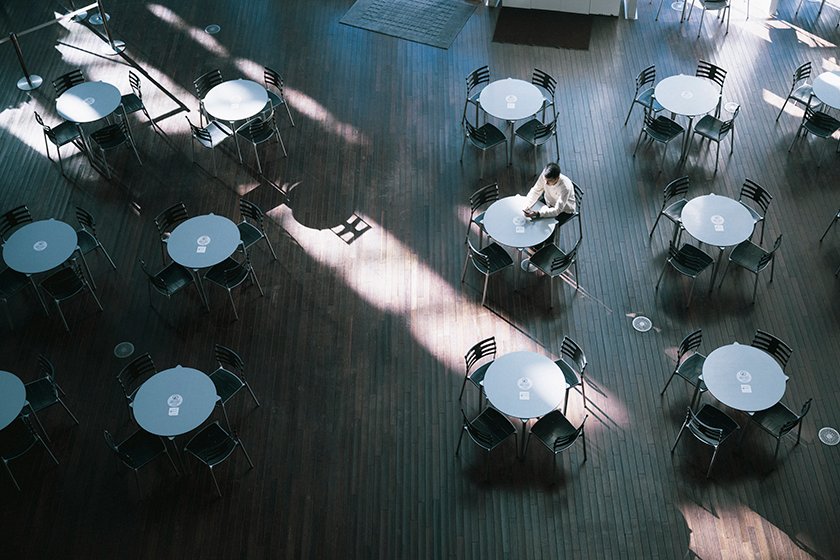
Acclimatize to the environment for the sake of creativity
I think I'm the type who tends to change myself instead of changing those around me. It's almost like how I can't change the environment around me in the Himalayas, even though I have climbed many mountains over 8,000 meters. If the air is thinner, your body has to acclimatize so that it can move in those conditions. In extreme environments, you can't turn the heater on to warm yourself even if it's cold, so you have to build endurance toward colder temperatures or equip yourself properly so that you can withstand the cold. Likewise, I have always been the one to acclimatize to the location as necessary.
I think the same goes for everyday life. For example, it doesn't matter if the city of Tokyo is creatively inclined or not. You can just be conscious about living creatively on your own. As long as we are conscious of it, grownups can act on their ideas however way we want. But it's very difficult for children to spend their time the way they want. In that sense, I think it would be good to have more places in cities that give children the opportunity to discover things. I believe providing children with lots of possibilities will lead to more creativity in future cities.
Reading a great book through to the end is the same as having gone on a journey
Outside of urban areas, there are many areas in Japan that put a lot of effort into facilities for children. Of course Tokyo has facilities like that as well, but my impression is that the ones elsewhere offer a lot more room for playing. What I really want to see are libraries where children can play. Current libraries are lined with tables where you aren't supposed to make noise because everyone there is reading or studying. That's good too, but I wish there was a kind of place that is a mix between a museum and a library and a park, where children can actively explore. Instead of having flat floors, it might have slopes and hills that let children feel unfamiliar spaces under their feet. Not necessarily a playground, but a space where children can move, sometimes read, rest, and even take a book outside if they want. It's a bummer when a facility intended for children requires prior booking or something. I just wish there were spaces that were more candid, where children can go exploring on an adventure.
I loved reading from when I was a kid, and I believe the books I read built the foundation of who I am. With smartphones and such taking up more of my time I don't read quite as much as I used to, but in middle school and high school I spent all of my spare time reading. Many times, I was so engrossed in a book on the train that I missed the stop I needed to get off at. I think reading a book is a journey. Even if you don't travel far, as long as you discover a good book and read it through, it's the same as having going on a voyage. I definitely want children to get that kind of experience.
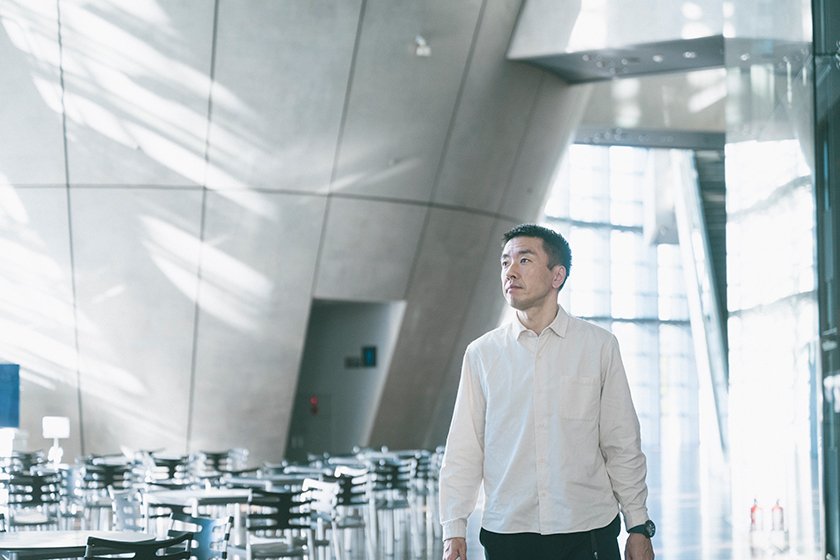
Pitch a tent on the grass in Roppongi with thoughts back to the city's past
I have lived in Tokyo since I was little, and even back then there weren't that many places where you could interact with nature. So I always yearned to play out in the fields of the great outdoors. I participated in nature school programs during summer breaks in middle school and high school. Meeting the canoeist Tomosuke Noda in high school also had a huge impact on me. I have been influenced by his books in many ways.
I know adventure camps for interacting with nature exist all over Japan, but it would be nice to create some kind of open field for children to learn about the outdoors even in the heart of a city like Roppongi. It could be as simple as pitching a tent on the grass square in Tokyo Midtown and sleeping there. Ideally, it would be a space for children to discover the obvious, like how bright a full moon can be, what a scary thing true darkness is, and how the sun rising brings warmth. I've never experienced spending a night in a tent in the middle of a city either, so I would love to see what that's like. I also mentioned earlier that everyone has their own maps based on their sense of scale, and I think it could be fun creating a new map of Roppongi together with children.
Activities for children like that is something I want to do more of. My other goal is to climb the last eight-thousander since I've already taken photos on thirteen of the fourteen peaks. I'm planning to summit the last one this April, so by the time this interview is published, I might be in Nepal again.
I want to keep taking photos like catching a ball thrown to me
While my immediate goal is to photograph the Himalayas, my long-term dream for the future is to take photos in outer space. Ever since they opened up the option of boarding spaceships to ordinary people, I have fully intended to apply. [laughs] But unfortunately the dates conflicted with my Himalaya expeditions. I would love to try again if the timing works out. The place I most want to go is Mars. I want to see the 24,000-meter Olympus Mons up close. Considering that's three times the height of the eight-thousanders I climb, it's exciting to think it will be a sight beyond my wildest imagination.
Olympus Mons
A shield volcano on Mars that is supposedly the biggest mountain in the Solar System, estimated to be around 24,000 meters high and 600 km wide at its base. It was long assumed to be extinct, but some signs of eruptions have been discovered, which may mean there is potential for future eruptions.
I'll also continue taking photographs on film. I generally take photos when my body reacts to something. For example, if an animal suddenly appeared in front of me right now, I would take a photograph as a kind of reflex. It doesn't matter what my reaction is, be it "Cool!" or "That's interesting," or "Eww, gross." I simply enjoy taking photographs of whatever my body reacts to--whatever prompts a "What's this?"
Waiting for the right moment for the perfectly composed shot is a wonderful thing too, but I want to take photographs in response to encountering something beyond my imagination. This is something I always say at my photography workshops, but a "like" on social media is basically "like whatever." It doesn't mean anything, so taking photos to get likes ruins your photos. People generally don't think too hard about the likes they give, right? The attention might give you a brief feeling of satisfaction, but in the end it's just content that gets consumed and that's it.
I think the essence of photographs lie in their wondrous, almost magical ability to freeze a moment in time. But in an age with widespread social media where tens of millions of photos are being snapped every day, taking photographs have become so commonplace that no one gives it a second thought anymore. Now with AI added to the mix, it's becoming an age where anything can be generated. That's precisely why I want to continue with film photography. Light-induced chemical reactions make an image appear on the film, so there is always an uncontrolled element that accompanies photography. I want to keep encountering those unintentional coincidences as I continue documenting the world.
Photo location: National Art Center, Tokyo
Editor's thoughts
When Ishikawa-san showed up for the interview, I saw that he was an enigmatic free spirit but also full of energy, a man existing without any pretense at all. His no-frills mentality hones his senses, priming him to react intuitively to the things that happen before him. His message that "you shouldn't assume you know" seems obvious but is surprisingly hard to do. It's an age where we're flooded with information. With the instant ability to look up any answer at our fingertips, it seems more important than ever to keep his message in mind. While I look forward to hearing the fortuitous news of him conquering all fourteen peaks, above all I hope that he will come home safe from his adventure.(text_akiko miyaura)
RANKING
ALL
CATEGORY




